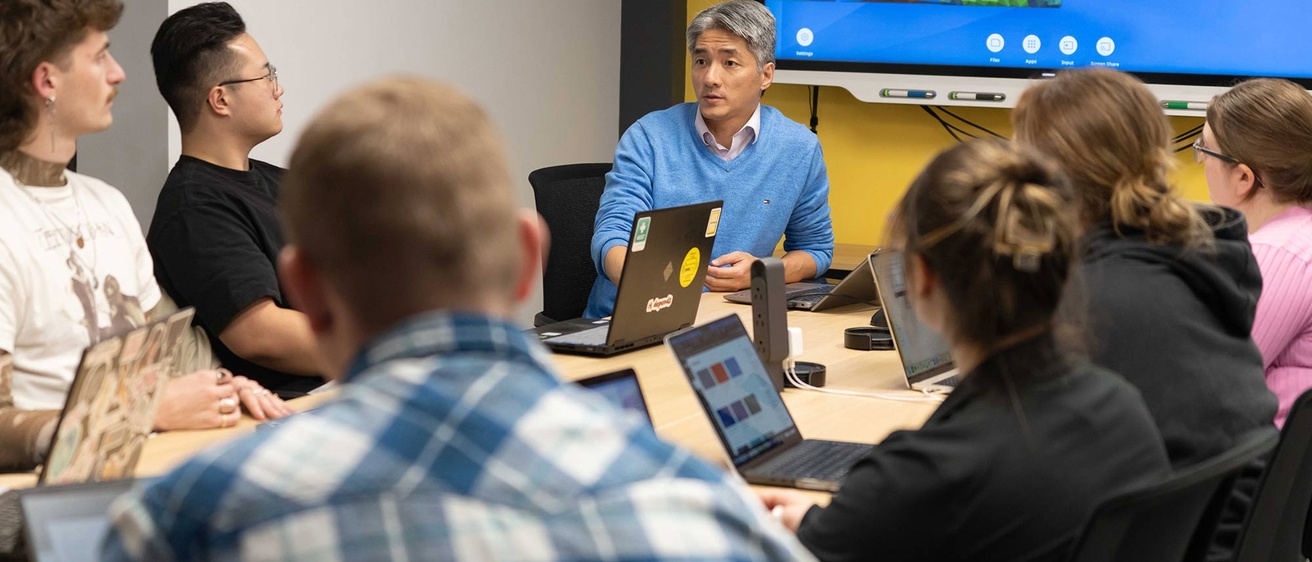The MA in Clinical Mental Health Counseling prepares graduates to work with clients across a spectrum of mental and emotional disorders, as well as to promote mental health and wellness.
The CMHC program prepares professional counselors to provide assistance with psychological wellness through flexible, consumer-oriented therapy to individuals experiencing various problems, including mental disorders and substance abuse. The program combines traditional psychotherapy with a practical, problem-solving approach that creates a dynamic, efficient path for change and problem resolution.
Program Overview
Our Master's program in Clinical Mental Health Counseling is fully accredited by the Council on Accreditation of Counseling and Related Professions (CACREP) and provides an array of community and clinical experiences to prepare clinically skilled, knowledgeable and committed mental health counselors.
Request More Information
Electives
As part of the MA in Clinical Mental Health, you will also take at least 9 s.h. of electives tailored to your academic goals and career interests. You will work with your program advisor to determine the best electives for you. Some electives include:
- Introduction to Substance Abuse
- Human Sexuality
- Introduction to Couple and Family Therapy
- Trauma Across the Lifespan
Clinical Opportunities
From practicums to internships, you will take part in a variety of clinical opportunities to give you experience with clients in the field during your time in the program.
Mental Health Counseling as a Profession
Mental health counselors work with individuals, couples, families, and groups that are dealing with issues that affect their mental health and well-being. They specialize in problems in living such as, but not limited to depression and anxiety, PTSD, ADHD, bipolar disorder, eating disorders, personality disorders, adjustment disorders, and substance abuse.
The MA in Clinical Mental Health Counseling prepares professional counselors to assist persons with psychiatric disabilities in particular and mental health conditions by coordinating resources and providing services.
- Private Practice
- Community Agencies
- Managed Behavioral Health Care Organizations
- Integrated Delivery Systems
- Hospitals
- Employee Assistance Programs (EAPs)
- Substance Abuse Treatment Centers
Financial Support
Additional materials regarding other forms of financial assistance are available through the Graduate College and The Office of Student Financial Aid.
Financial Support
Graduate Assistantships and Fellowships
Graduate Assistantships at the University of Iowa are designed to provide students with work experience and a means to finance their education while providing the University with the benefit of an innovative work force. Some assistantships are closely related to specific departments or fields, and all require specific skills or aptitudes. An assistantship in any office on campus could provide valuable experience, open new career paths, and help finance your graduate education. In addition to a monthly salary, assistantships frequently provide a tuition scholarship. Positions vary from quarter-time (10 hours per week) to half-time (20 hours per week).
The majority of graduate assistantships at the University of Iowa are in the bargaining unit of the graduate student union. Offices that have recently employed students include (but are not limited to): Belin-Blank Center for Gifted Education, Orientation Services, Division of Student Life, Pomerantz Career Center, Admissions, Student Health, Honors Program, Student Disabilities Services. You may also check the Handshake website for student employment at the University of Iowa (search term = graduate).
Some students with an interest in private colleges find part-time employment or practica at one of several colleges within easy driving distance to Iowa City, including Cornell College, Coe College, Mount Mercy College, and Saint Ambrose University.
Special Support Services
Individuals with disabilities who are considering application to the program are encouraged to contact Student Disability Services (SDS), 141 University Capitol Centre, (319) 335-1462, for information related to resources and academic life relevant to students with disabilities. SDS provides a wide array of support services for students with disabilities.
Faculty and Research
To see associated faculty, please: Visit Faculty Listing
Admissions and Application
- To ensure full consideration, please submit your complete application by December 1. Applications received after this date will be reviewed on a rolling basis, subject to space in the program.
- Interviews will be begin in late January and continue through February.
- Applicants can expect admission decisions between March and April.
Admission Requirements
- A bachelor’s degree from a Regionally Accredited American College or University, or an equivalent degree from another country as determined by the Office of Admissions
- Undergraduate grade-point average (GPA) of 3.00 or better on a four-point scale
- English Proficiency Requirements (international applicants)
- A personal interview (in person or by telephone) with the faculty
Required Supplemental Materials
- Official transcripts from all post-secondary institutions
- Official TOEFL scores may be required for some non-native speakers of English
- Current Resume
- A statement of purpose, including a statement of your personal career objectives.
- Three letters of recommendation*
Apply Now
Please review the required supplemental documents above before starting the general graduate application. To begin the application process, set up an account with an existing email address and password
Program Resources
Mission, Vision, and Overview
Program Vision
To be the premier graduate clinical mental health counseling education program recognized for its diversity, and known for excellence in teaching, learning and research.
Program Mission
The mission of the Graduate Program in Clinical Mental Health Counseling at The University of Iowa is to increase opportunities for participation and choices of people served through education, training, research, leadership, and community engagement.
Graduate Program in Clinical Mental Health Counseling
The program is a consumer-focused mental health counseling and counselor education program. For many years, The University of Iowa has contributed numerous practitioners, educators, researchers, and administrators to the profession of mental health counseling. The programs have achieved national recognition through many faculty and student awards and publications. The master's program is accredited by the Council on Accreditation on Counseling and Related Education Programs (CACREP) and it is in good standing.
The Graduate Programs in Clinical Mental Health Counseling is part of the College of Education as well as the Department of Rehabilitation and Counselor Education. In addition to clinical mental health counseling, the Department provides accredited M.A. programs in school counseling and rehabilitation counseling. At the doctoral level, the Department offers the counselor education and supervision degree. The close coordination and support among the Department's programs provide students access to a wide range of faculty and courses.
Professional Organizations related to Clinical Mental Health Counseling
Accreditation
This program is administered through the Department of Counselor Education. To see accreditation information, academic, and outcomes measures, please visit the CE Accreditation page.
News

Allies in Healing
Discover how Associate Professor Katy Schroeder is at the forefront of advancing animal-assisted therapy. Through her research and mentorship, she is shaping the next generation of counselors to implement these methods ethically and effectively.
Contact Us
Counselor Education Department Main Office:
N338 Lindquist Center
319-335-5275
Katy Schroeder, Program Coordinator
N350 Lindquist Center
319-467-4910
kathryn-schroeder-1@uiowa.edu
Application questions can be directed to:
Joshua Lobb, Constituent Relations Coordinator
319-384-0671
joshua-lobb@uiowa.edu
